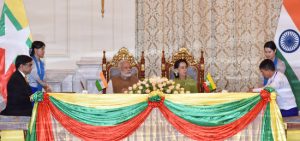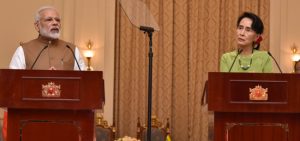 Nay Pyi Taw (Myanmar): In a delicate diplomatic balancing act, India has upgraded its economic and developmental cooperation with Myanmar, but played it safe on the alleged persecution of Rohingya minority in the Southeast Asian state.
Nay Pyi Taw (Myanmar): In a delicate diplomatic balancing act, India has upgraded its economic and developmental cooperation with Myanmar, but played it safe on the alleged persecution of Rohingya minority in the Southeast Asian state.
During his meeting with State Counselor Aung San Suu Kyi, Prime Minister Narendra Modi expressed concern over “extremist violence” and offered a slew of development projects for the Rakhine state which is in grip of an unfolding humanitarian crisis. He, however, didn’t mention the plight of the Rohingya Muslim community, which the UN and other international agencies fear could turn into a humanitarian crisis. India’s cautious stand partly emanated from its strategic intent to build stronger ties with the resource-rich Myanmar, where China has entrenched itself in crucial sectors, by rallying in solidarity with the beleaguered Suu Kyi who is facing intense international pressure and scrutiny over the alleged violence against the Rohingya community. This is in line with the Indian government telling the Supreme Court that it stands firm in its decision to deport the Rohinyas.
The stability of the violence-hit Rakhine state is crucial for the proposed development projects like the Kaladan multi-modal transport project that would link Myanmar with India and the opening of the Myanmar end of the oil and gas pipeline with China.
“We hope that all stakeholders together can find a way out in which unity and territorial integrity of Myanmar is respected,” said the joint statement after wide-ranging talks between PM Modi and Ms Suu Kyi on September 7.
Taking a nuanced stand, the two sides agreed that “the situation in Rakhine State had a developmental as well as a security dimension.” In this regard, India advocated a development-centric approach and offered to partner Myanmar in building infrastructure and socio-economic projects in the Rakhine state.
The talks in Nay Pyi Taw resulted in an all-encompassing vision to bolster India-Myanmar collaboration across the spectrum, especially in economic and strategic spheres. The two sides inked six pacts in diverse areas, including maritime security cooperation, electoral training, health, training and enhanced cultural and media exchanges.
Terror Connect
 Jointly combating terrorism figured prominently in the talks. “The two leaders discussed the security situation prevailing along their borders and expressed concern at various incidents of terrorism and extremist-inspired violence that have taken place in their respective territories,” said the statement. Myanmar condemned the recent barbaric terror attacks during the Amarnath Yatra, and India condemned recent terror attacks in the northern Rakhine state. “India condemned the recent terrorist attacks in northern Rakhine State, wherein several members of the Myanmar security forces lost their lives,” said the statement.
Jointly combating terrorism figured prominently in the talks. “The two leaders discussed the security situation prevailing along their borders and expressed concern at various incidents of terrorism and extremist-inspired violence that have taken place in their respective territories,” said the statement. Myanmar condemned the recent barbaric terror attacks during the Amarnath Yatra, and India condemned recent terror attacks in the northern Rakhine state. “India condemned the recent terrorist attacks in northern Rakhine State, wherein several members of the Myanmar security forces lost their lives,” said the statement.
There was a strong connect on intensifying cooperation in the international arena by fast-tracking the finalization and adoption of a Comprehensive Convention on International Terrorism by the United Nations General Assembly.
Author Profile
- India Writes Network (www.indiawrites.org) is an emerging think tank and a media-publishing company focused on international affairs & the India Story. Centre for Global India Insights is the research arm of India Writes Network. To subscribe to India and the World, write to editor@indiawrites.org. A venture of TGII Media Private Limited, a leading media, publishing and consultancy company, IWN has carved a niche for balanced and exhaustive reporting and analysis of international affairs. Eminent personalities, politicians, diplomats, authors, strategy gurus and news-makers have contributed to India Writes Network, as also “India and the World,” a magazine focused on global affairs.
Latest entries
 DiplomacyJanuary 5, 2026India walks diplomatic tightrope over US operation in Venezuela
DiplomacyJanuary 5, 2026India walks diplomatic tightrope over US operation in Venezuela India and the WorldNovember 26, 2025G20@20: Africa’s Moment – The Once and Future World Order
India and the WorldNovember 26, 2025G20@20: Africa’s Moment – The Once and Future World Order DiplomacyOctober 4, 2025UNGA Resolution 2758 Must Not Be Distorted, One-China Principle Brooks No Challenge
DiplomacyOctober 4, 2025UNGA Resolution 2758 Must Not Be Distorted, One-China Principle Brooks No Challenge India and the WorldJuly 26, 2025MPs, diplomats laud Operation Sindoor, call for national unity to combat Pakistan-sponsored terror
India and the WorldJuly 26, 2025MPs, diplomats laud Operation Sindoor, call for national unity to combat Pakistan-sponsored terror







